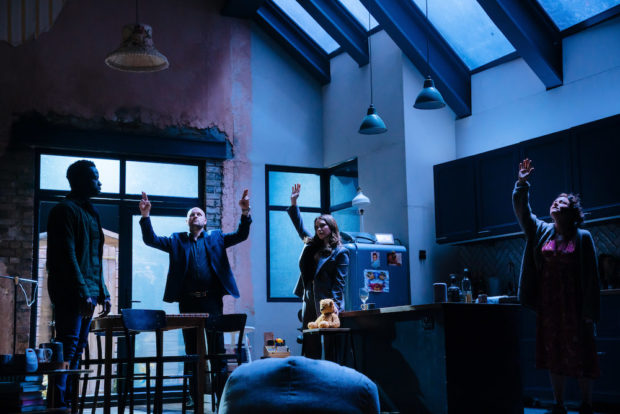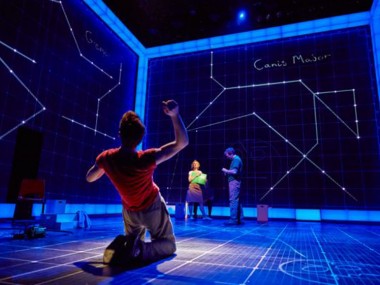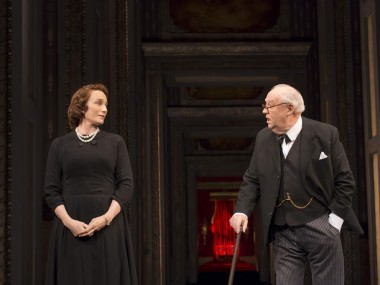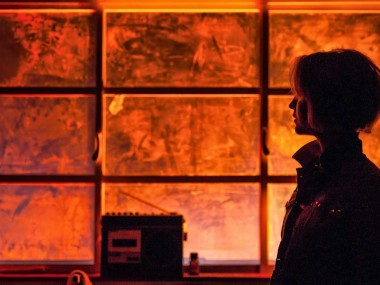2:22 A Ghost Story, Apollo Theatre
Wednesday 31st May 2023

Can you enjoy a ghost story during summer? Usually the idea of a haunted house suggests images of dark winter nights, thunder and lightning, and howling wolves. These atmospheric factors are certainly present in 2:22 A Ghost Story, written by award-winner Danny Robins, creator of the hit BBC podcast The Battersea Poltergeist. There is a gloomy old house, thunder, lightning and fog, but instead of wolves we have screeching foxes and the most vulnerable creature is a child’s teddy bear. There are also plenty of noisy screams — subtle this show ain’t.
Stepping into the Apollo Theatre from the admittedly weak London sunshine is an odd experience, especially as this West End venue, run by Nimax theatres, deafens us all with super loud rock music, perhaps an indicator of its populist desire to appeal to a young audience. On stage a large digital clock is running through its numbers, jumping ominously from 2:22 to 4 something, a definite sign that things will go bump in the night. Despite the rather unsubtle punctuation of every scene change with a high voltage scream and gothic blood-red lighting — which begins the show and loses its impact with every subsequent occurrence — the story begins in normality.
Jenny, a young mother, and husband Sam, a rationalist academic scientist, have bought an old London house from a widow and are in the process of renovating it. The whole area is being gentrified, and going up in the world. As a housewarming gesture, they invite Lauren — a mental-health specialist and Sam’s university friend who they have known for years — and her new partner Ben, a builder. Sam has just come back from a work trip and Jenny tells him and her friends that, while he was away, she has heard strange noises coming from the room in which their baby sleeps at night. To be precise: at 2:22 in the morning.
Fearing that the house is haunted by a ghost, and that her child is in danger, Jenny asks Sam and their friends to stay up until 2:22 to witness the spectral visitation. The request provokes a lively debate about whether ghosts actually exist, or whether they are figments of tired or stressed imaginations. Sam is militantly skeptical about the supernatural, but Lauren, whose training in psychology inclines her towards rationalism, nevertheless shares her own uncanny experiences. When Ben reveals his childhood experiences with ghosts and séances, this is an excuse for a classic sequence when he attempts to talk to spirits from beyond.
As the clock shows the witching hour approach, there is a real sense of tension. In the meantime, the friends talk about whether ghosts exist, and if they do, why aren’t they more of them, and why do they haunt us, and houses instead of, say, hospitals. How do the dead communicate with us, and why? They also talk about how fear is a primal human emotion, the difference between our lizard brain (basic instincts) and our monkey brain (more considered thinking), as well as about gentrification and class. Working-class Ben is particularly acute about middle-class Sam’s attempts to be matey.
Various explanations are given about Jenny’s experiences of the haunting: because of the new baby she is sleep deprived, and therefore susceptible to suggestion. As an audience we are also alert to how, in the past (Gaslight is the classic example), men have used the supernatural in order to control their women. When Sam says that he lost his phone during his trip, and could not contact Jenny, the suspicion arises that he never left the area. Likewise, the question of his relationship with Lauren — is it as innocent as it seems? — is signaled early on. It is part of the charm of this modern ghost story that these issues are all exploded by the final plot twist.
I have to say that, unlike many audience members, I found the final revelation completely unconvincing and preposterous. Still, this has not prevented the show from being a huge success. Now on its sixth cast, laden with several awards, and boasting previous actors which have included Cheryl of Girls Aloud fame and singer Lily Allen, the play, which premiered in 2021, is effectively critic proof. Matthew Dunster’s clockwork production, designed by Anna Fleischle, features Jaime Winstone (Jenny), Clifford Samuel (Sam), Sophia Bush (Lauren) and Ricky Champ (Ben). On the night I saw it the performances were a bit too shouty and crude, with little emotional interaction between the characters. Despite the hype, the most chilling thing about the evening was the air-con.
This review first appeared on The Theatre Times



